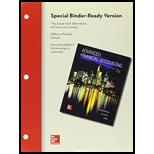
LOOSE-LEAF Advanced Financial Accounting with Connect
11th Edition
ISBN: 9781259605192
Author: Theodore E. Christensen
Publisher: McGraw-Hill Education
expand_more
expand_more
format_list_bulleted
Concept explainers
Question
Chapter 17, Problem 17.7Q
To determine
Budgetary aspect of governmental operations: the governmental accounting uses budgets to assist in management control and to provide legal authority to levy taxes, and collect revenue, and make expenditures in accordance with budget. A government unit may have several types of budgets which includes.
- Operating budgets that specify expected revenue from various sources provided by law. The operating budget includes expected expenditures such as employees payrolls, supplies etc.
- Capital budgets to provide information about proposed construction projects.
To explain: what is meant by budgetary accounting? Explain the accounting for expected revenue and anticipated expenditure?
Expert Solution & Answer
Want to see the full answer?
Check out a sample textbook solution
Students have asked these similar questions
Can you demonstrate the proper approach for solving this financial accounting question with valid techniques?
Please give me true answer this financial accounting question
Can you help me find the accurate solution to this financial accounting problem using valid principles?
Chapter 17 Solutions
LOOSE-LEAF Advanced Financial Accounting with Connect
Ch. 17 - Prob. 17.1QCh. 17 - What are the nine funds that local and state...Ch. 17 - Compare the modified accrual basis with the...Ch. 17 - Prob. 17.4QCh. 17 - When are property taxes recognized as revenue in...Ch. 17 - Prob. 17.6QCh. 17 - Prob. 17.7QCh. 17 - Are all expenditures encumbered?Ch. 17 - Prob. 17.9QCh. 17 - Prob. 17.10Q
Ch. 17 - When is the expenditure for inventories recognized...Ch. 17 - Prob. 17.12QCh. 17 - Prob. 17.13QCh. 17 - Prob. 17.14QCh. 17 - Prob. 17.15QCh. 17 - Prob. 17.1CCh. 17 - Prob. 17.2CCh. 17 - Prob. 17.3CCh. 17 - Prob. 17.1.1ECh. 17 - Prob. 17.1.2ECh. 17 - Prob. 17.1.3ECh. 17 - Prob. 17.1.4ECh. 17 - Prob. 17.1.5ECh. 17 - Prob. 17.2ECh. 17 - Prob. 17.3.1ECh. 17 - Prob. 17.3.2ECh. 17 - Prob. 17.3.3ECh. 17 - Prob. 17.3.4ECh. 17 - Prob. 17.3.5ECh. 17 - Prob. 17.3.6ECh. 17 - Prob. 17.3.7ECh. 17 - Prob. 17.3.8ECh. 17 - Prob. 17.3.9ECh. 17 - Prob. 17.3.10ECh. 17 - Prob. 17.4.1ECh. 17 - Prob. 17.4.2ECh. 17 - Prob. 17.4.3ECh. 17 - Prob. 17.4.4ECh. 17 - Prob. 17.4.5ECh. 17 - Prob. 17.4.6ECh. 17 - Prob. 17.4.7ECh. 17 - Prob. 17.4.8ECh. 17 - Prob. 17.4.9ECh. 17 - Prob. 17.4.10ECh. 17 - Prob. 17.5ECh. 17 - Prob. 17.6ECh. 17 - Prob. 17.7ECh. 17 - Computation of Revenues Reported on the Statement...Ch. 17 - Prob. 17.9ECh. 17 - Prob. 17.10ECh. 17 - Prob. 17.11ECh. 17 - Prob. 17.12ECh. 17 - General Fund Entries [AICPA Adapted] The following...Ch. 17 - Prob. 17.14PCh. 17 - Prob. 17.15PCh. 17 - Prob. 17.16PCh. 17 - Prob. 17.17PCh. 17 - Prob. 17.18.1PCh. 17 - Prob. 17.18.2PCh. 17 - Prob. 17.18.3PCh. 17 - Prob. 17.18.4PCh. 17 - Prob. 17.18.5PCh. 17 - Prob. 17.18.6PCh. 17 - Prob. 17.18.7PCh. 17 - Prob. 17.18.8PCh. 17 - Prob. 17.18.9PCh. 17 - Prob. 17.18.10PCh. 17 - Prob. 17.18.11PCh. 17 - Prob. 17.18.12PCh. 17 - Prob. 17.18.13PCh. 17 - Prob. 17.18.14PCh. 17 - Prob. 17.18.15PCh. 17 - Prob. 17.18.16PCh. 17 - Prob. 17.18.17PCh. 17 - Prob. 17.18.18PCh. 17 - Prob. 17.18.19PCh. 17 - Prob. 17.18.20PCh. 17 - Prob. 17.18.21PCh. 17 - Prob. 17.18.22PCh. 17 - Prob. 17.18.23PCh. 17 - Prob. 17.18.24PCh. 17 - Prob. 17.18.25PCh. 17 - Prob. 17.18.26PCh. 17 - Prob. 17.18.27PCh. 17 - General Fund Entries [AICPA Adapted] DeKalb City...Ch. 17 - Prob. 17.18.29PCh. 17 - Prob. 17.18.30PCh. 17 - Prob. 17.18.31PCh. 17 - General Fund Entries [AICPA Adapted] DeKalb City...Ch. 17 - Prob. 17.18.33PCh. 17 - Prob. 17.18.34PCh. 17 - Prob. 17.18.35PCh. 17 - General Fund Entries [AICPA Adapted] DeKalb City...Ch. 17 - Prob. 17.18.37PCh. 17 - Prob. 17.18.38PCh. 17 - Prob. 17.18.39PCh. 17 - Prob. 17.19PCh. 17 - Prob. 17.20P
Knowledge Booster
Learn more about
Need a deep-dive on the concept behind this application? Look no further. Learn more about this topic, accounting and related others by exploring similar questions and additional content below.Similar questions
- How can I solve this financial accounting problem using the appropriate financial process?arrow_forwardA business purchased machinery for $210,000 on January 1, 2023. The machinery will be depreciated over the seven years of its estimated useful life using the straight-line depreciation method. The business records depreciation once a year on December 31. Which of the following is the adjusting entry required to record depreciation on the machinery for the year 2023? (Assume the residual value of the acquired machinery to be zero.) A) Debit $210,000 to Machinery, and credit $180,000 to Cash. B) Debit $30,000 to Depreciation Expense-Machinery, and credit $30,000 to Accumulated Depreciation-Machinery. C) Debit $210,000 to Depreciation Expense-Machinery, and credit $180,000 to Accumulated Depreciation-Machinery. D) Debit $30,000 to Depreciation Expense, and credit $30,000 to Machinery.arrow_forwardI need help with question is correct answer and accountingarrow_forward
arrow_back_ios
SEE MORE QUESTIONS
arrow_forward_ios
Recommended textbooks for you
- Principles of Accounting Volume 2AccountingISBN:9781947172609Author:OpenStaxPublisher:OpenStax College
 Survey of Accounting (Accounting I)AccountingISBN:9781305961883Author:Carl WarrenPublisher:Cengage Learning
Survey of Accounting (Accounting I)AccountingISBN:9781305961883Author:Carl WarrenPublisher:Cengage Learning  Cornerstones of Cost Management (Cornerstones Ser...AccountingISBN:9781305970663Author:Don R. Hansen, Maryanne M. MowenPublisher:Cengage Learning
Cornerstones of Cost Management (Cornerstones Ser...AccountingISBN:9781305970663Author:Don R. Hansen, Maryanne M. MowenPublisher:Cengage Learning

Principles of Accounting Volume 2
Accounting
ISBN:9781947172609
Author:OpenStax
Publisher:OpenStax College


Survey of Accounting (Accounting I)
Accounting
ISBN:9781305961883
Author:Carl Warren
Publisher:Cengage Learning

Cornerstones of Cost Management (Cornerstones Ser...
Accounting
ISBN:9781305970663
Author:Don R. Hansen, Maryanne M. Mowen
Publisher:Cengage Learning
Responsibility Accounting| Responsibility Centers and Segments| US CMA Part 1| US CMA course; Master Budget and Responsibility Accounting-Intro to Managerial Accounting- Su. 2013-Prof. Gershberg; Author: Mera Skill; Rutgers Accounting Web;https://www.youtube.com/watch?v=SYQ4u1BP24g;License: Standard YouTube License, CC-BY